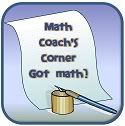RESEARCH: The Effect of Math Vocabulary Tests Every Two Weeks on the Retention of Math Vocabulary for Third Grade Students
In our Google research, we found RIT leveled vocabulary lists and scores. The scores are used in MAP tests (Measures of Academic Progress).
The RIT Scale is a curriculum scale that uses individual item difficulty values to estimate student achievement. An advantage of the RIT scale is that it can relate the numbers on the scale directly to the difficulty of items on the tests. In addition, the RIT scale is an equal interval scale. Equal interval means that the difference between scores is the same regardless of whether a student is at the top, bottom, or middle of the RIT scale, and it has the same meaning regardless of grade level.
RIT scales, like scales underlying most educational tests, are built from data about the performance of individual examinees on individual items. The theory governing scale construction is called Item Response Theory (IRT). NWEA uses a specific IRT model conceived by Danish mathematician, Georg Rasch, (1901-1980). Rasch is best known for his contributions to psychometrics, and his model is used extensively in assessment in education, particularly for skill attainment and cognitive assessments.
Characteristics of the RIT Scale include:
- It is an achievement scale.
- It is an accurate scale.
- It is an equal interval scale.
- It helps to measure growth over time.
- It has the same meaning regardless of grade or age of the student.
Tests are created by the NWEA (Northwest Evaluation Association), a non-profit dedicated to helping all children learn. NWEA provides research-based assessments, professional training, and consulting services to improve teaching and learning.
Could this be our model for vocabulary instruction, assessments and portfolio data?
A commercial site, PUZZLE WISE, is used to increase RIT scores. The following are materials found on the PUZZLE WISE site and miscellaneous links related to vocabulary instruction.
RESEARCH: Results of Study of the Effects of Puzzle Wise Books on 3rd - 6th Graders Math Achievements Scores.
PuzzleWise™ Benefits
Students: Students receive the repetition and spiraling they need, both within their grade and also year-to-year, that is necessary to build a solid foundation of science and math knowledge and understanding, and develop the essential skills of critical thinking, problem solving, and resourcing while communicating strategies with their peers.
Teachers: Teachers benefit from a wealth of teachable moments and mini-lessons that lead to higher-level academic conversations and discussions (academic discourse).
Parents/Guardians: Parents and guardians enjoy an activity that builds stronger relationships with their children, while becoming more involved in their child’s learning, extending important academic support through the years.
NOTE: The following links were found on sites other than the PuzzleWise pages.
- Here are Math RIT vocab levels for ISAT vocabulary: http://www.d25.k12.id.us/curric/isatvocab.pdf
- Here are vocabulary and symbols with RIT scores. More!
- Online Sample tests
- Achievement Chart
- Class Performance Scales and Charts ****VERY INTERESTING!
- How to use data to flexible group students!
- Vocabulary across grade levels (Kansas)



















0 comments:
Post a Comment